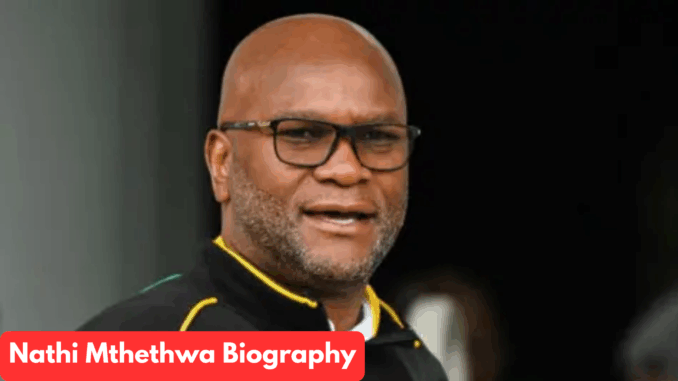
Nkosinathi Emmanuel “Nathi” Mthethwa was a prominent South African politician and diplomat whose career spanned decades — from activist and ANC Youth League leader to cabinet minister and, most recently, South Africa’s ambassador to France.
His public life included high-profile portfolios (Safety and Security / Police; Arts and Culture; Sports, Arts and Culture) and ended tragically when he was found dead in Paris in late September 2025.
Bio Data
- Full Name: Nkosinathi Emmanuel Mthethwa
- Stage Name: Nathi Mthethwa
- Born: January 23, 1967
- Age: 58 (at the time of death in 2025)
- Death: September 30, 2025
- Birthplace: Clermont, Durban, KwaZulu-Natal, South Africa
- Nationality: South African
- Occupation: Politician, Diplomat
- Religion: Christianity
- Spouse: Philisiwe Buthelezi
- Net Worth: Estimated around $1 million – $3 million (as of 2025)
Early life and education
Nathi Mthethwa was born on 23 January 1967 in Clermont, a township outside Durban in what was then Natal Province. He grew up in the Durban area, with formative years in Klaarwater and on the outskirts of KwaMbonambi. His early background and activism set the stage for a long career in the African National Congress (ANC).
Mthethwa pursued further studies while building his political career: sources list a diploma in community development, a certificate in mining engineering, and further communications and leadership training. These credentials, combined with his ANC involvement, helped him navigate the party and national institutions.
Rise in the ANC and entry to the National Assembly
Mthethwa rose through the ranks of the ANC Youth League and became more visible on the national stage in the early 2000s. He entered the National Assembly in 2002 and, following the ANC’s internal shifts after the 2007 national conference, was appointed Chief Whip of the Majority Party in January 2008 — a role that thrust him further into the parliamentary political spotlight.
Ministerial career — Police and safety
In September 2008, Mthethwa was appointed to head the national safety and security portfolio (later renamed Minister of Police). He served in that role until 2014. His tenure in the police ministry is among the most scrutinized periods of his career because of high-profile events and policy shifts that occurred under his leadership.
A crucial and controversial episode during his time as police minister was the 2012 Marikana massacre — the police killing of striking mineworkers which resulted in national outrage and long-term inquiries. Critics and commentators have linked aspects of policing policy, political accountability, and ministerial oversight to that tragedy; Mthethwa’s role in the wider environment of policing and accountability has been part of that scrutiny. Later reporting and investigations have also tied broader allegations about political interference and failures to investigate political killings in certain provinces to the era during which he served in influential positions.
Arts, culture, and sport — a shifted portfolio
After leaving the police portfolio in 2014, Mthethwa transitioned to the Ministry of Arts and Culture (2014–2019) and, after cabinet reshuffles, became Minister of Sports, Arts and Culture (2019–2023). In these roles he championed cultural programmes and sports development but also had to navigate funding controversies, administrative challenges, and political debates about priorities and governance in cultural institutions.
Fall from the cabinet and diplomatic posting
In March 2023, President Cyril Ramaphosa removed Mthethwa from the cabinet, and shortly thereafter he resigned from the National Assembly. By early 2024, Mthethwa was appointed South Africa’s ambassador to France and presented his credentials as Ambassador and permanent delegate to UNESCO in early 2024. The posting moved him from domestic politics to a diplomatic role in Paris.
Death in Paris and investigation
On 30 September 2025, South African and French media reported that Nathi Mthethwa had been found dead at a Paris hotel. Early official statements and reporting said he had been reported missing the previous evening, and that French investigators found him below a window on the 22nd floor of the hotel; a Paris prosecutor indicated the window safety mechanism had been tampered with and investigators had not ruled out a deliberate act, though probes continued. South African authorities and political leaders expressed sorrow and pledged to work with his family on repatriation arrangements.
Personal life
Mthethwa was married to Philisiwe Buthelezi; their public wedding was noted in 2013. Over his long political life he made many allies and enemies — as is often the case for high-profile public servants — and his family and colleagues have been central in responses to both praise and criticism of his record.
Legacy
Nathi Mthethwa’s legacy is complex. He held powerful ministerial posts and a diplomatic assignment, championed arts and cultural initiatives, and played a central role in security and policing policy during tumultuous years. For some he was a committed public servant who brought stability and direction to portfolios; for others his tenure is inseparable from controversies — especially around policing during the Marikana events and later allegations that attracted media and parliamentary attention. Public reactions to his death reflected both respect for his public service and unresolved questions from his time in office.
Frequently Asked Questions
Who was Nathi Mthethwa?
Nkosinathi Emmanuel “Nathi” Mthethwa was a South African politician and diplomat who served as Minister in several portfolios and as South Africa’s ambassador to France.
When and where was he born?
He was born on 23 January 1967 in Clermont, Durban (then Natal Province).
What controversies are linked to his career?
His time overseeing policing coincided with the 2012 Marikana massacre, and later reporting has explored allegations tied to political interference and failures to properly investigate political killings.
When did he die?
He was found dead at a Paris hotel on 30 September 2025; French authorities launched an investigation.
Conclusion
Nathi Mthethwa’s story is one of political ascent, public service, controversy, and an unexpected diplomatic final chapter.
As investigators, historians, and the public continue to assess his life, the facts — and the debates around them — will continue to shape how he is remembered.
Leave a Reply